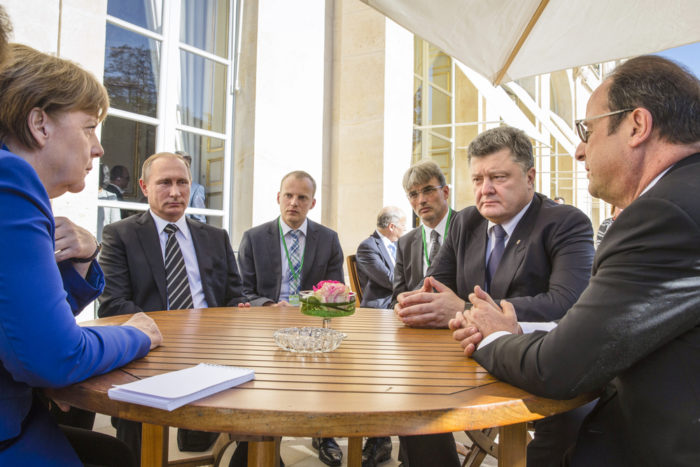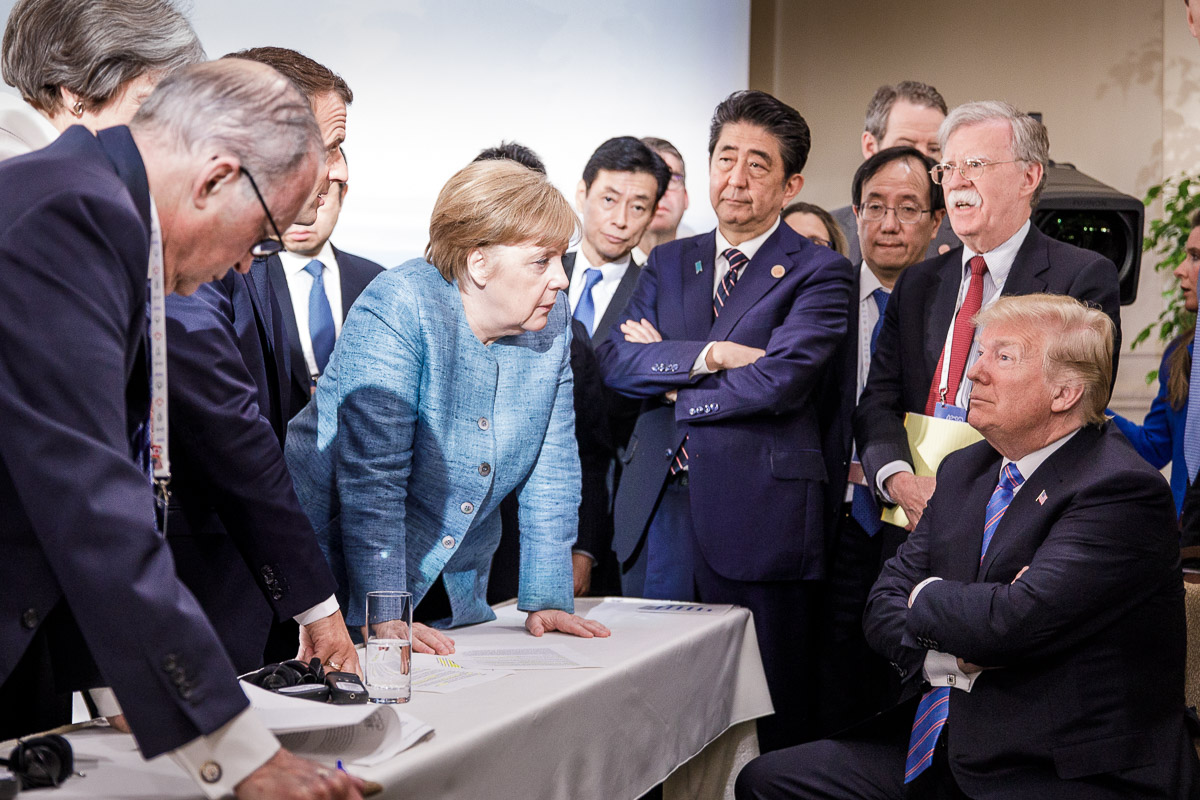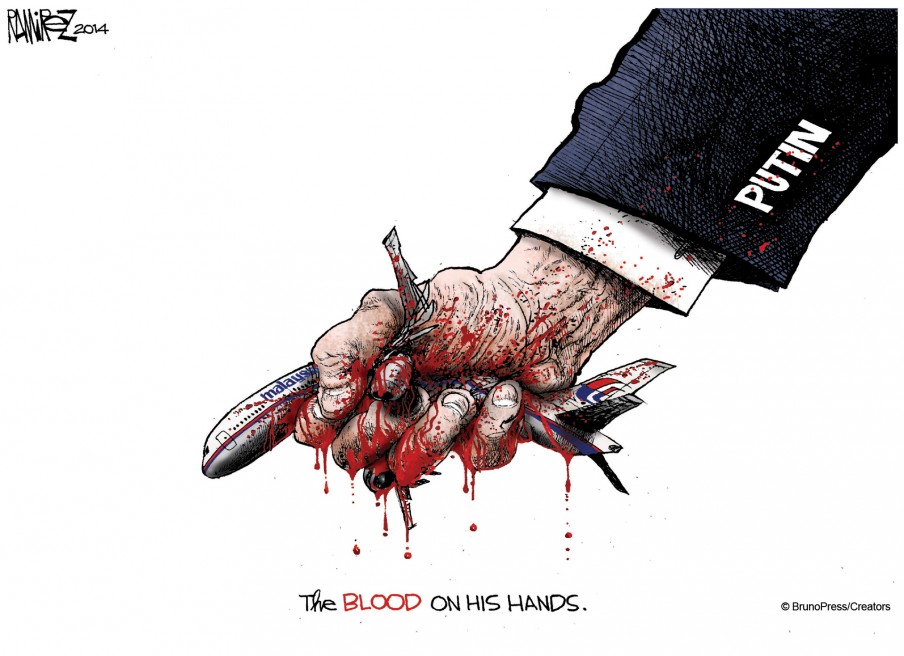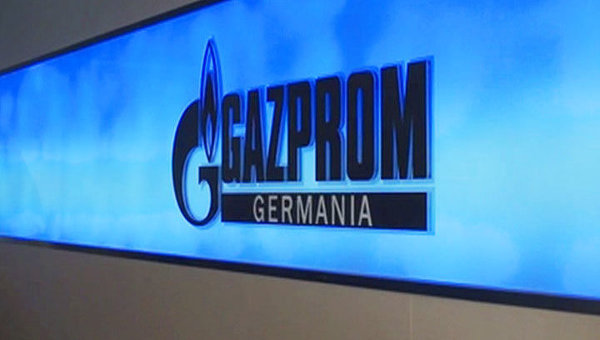President Putin has allegedly been disappointed by the statement of Angela Merkel, where she claimed that the Minsk agreements of 2014 and 2015 enabled Ukraine to prepare for the war with Russia.
The former German Chancellor recently said that the Minsk Agreements, signed in 2014, had given Ukraine “precious time” to become stronger, and the results of this could now be seen. She emphasized that Ukraine in 2014-2015 was very different from Ukraine today.
The response from the Kremlin-controlled “media” (not to be confused with a free, independent press) was predictable. Russian Foreign Ministry Spokeswoman Maria Zakharova argued that the “confession” by Merkel “says the horrible: fraud as modus operandi of the West – machinations, manipulations, all kinds of distortion of truth, law, and justice imaginable.”
“They [Western representatives – TASS] knew it back then, in 2015, already, when they held hours-long talks, they knew that they would never implement it, that they would pump the Kyiv regime with weapons,” the diplomat underscored. “They had no mercy for anyone: women, children, civilians of Donbas and Ukraine in general. They needed conflict, and they were ready for it back then already, back in 2015.”
There is a lot to be said about both the statement of Angela Merkel and Maria Zakharova.
Merkel’s statement is not incorrect, but highly selective in its presentation of the facts.
The Minsk Agreements did indeed buy Ukraine time to regenerate and rebuild its Armed Force.
The onset of war in 2014 exposed Ukraine as completely unprepared. The Armed Forces of Ukraine (AFU) were not manned, equipped, or trained to meet Russian aggression. Ukraine was neither psychologically nor legally prepared for a hybrid war. Its logistic stockpiles were, except for weapons and ammunition mostly from the Soviet period, non-existent. At the beginning of the war, there was virtually no budget. The command-and-control system was not suited to combat activities.
Despite the low-intensity war in parts of Donbas, the Sea of Azov, and the Black Sea, and the Hybrid War aiming to destabilize Ukraine from within conducted across all of Ukraine, Ukraine still managed to conduct essential reforms, force generations, and preparations for the full-scale invasion that followed.
Defending her legacy, Merkel leaves out crucial information that undermines her alleged “good intentions” at the time.
The most obvious omission is that it also allowed Russia to prepare for its forthcoming full-scale war.
It continued the ongoing process of modernizing its Armed Forces (which luckily has proven less successful than anticipated), building new bases and relocating military forces close to Ukraine’s international border, militarise the Crimean Peninsula, establishing, manning, equipping, training, and testing the 1st and 2nd Army Corps inside Donbas, uphold its Hybrid War and attempt to undermine Ukraine, and not least, test the resolve of the West.
The Western resolve was tested and found lacking mostly because of the Minsk Agreements. It demonstrated an extreme cynicism by signing on to a “peace plan” (Minsk Agreement and Protocol) as the only “alternative for a peaceful resolution of the war,” even though it by default could not possibly ensure peace and was openly discussing another reset of the relationship between Russia and the West.
Merkel left out the fact that the main purpose of the Armed Forces of any democratic country is to deter war.
The NATO member states – including Germany – collectively failed to support Ukraine’s efforts to rebuild a credible deterrence until the full-scale invasion was inevitable. Ukraine was denied weapon supplies for eight years to “avoid an escalation of the war,” as the West tried to adhere to the intention of the so-called Minsk Agreements: to find a political solution to the war.
However, the West also demonstrated a lack of commitment toward Ukraine.
The actions – or rather the inaction – of NATO and the EU might have led Putin to the conclusion that the West wasn’t committed to upholding peace and stability according to NATO’s strategic concept and was not prepared to support Ukraine in its defense against Russia. The fact that most member states did not strengthen their defense budgets despite the war in 2014 further strengthened the impression of a weak and uncommitted West. The lack of response to the Hybrid War it was waging against the West reinforced the assessment.
While the Minsk agreements enabled Ukraine to prepare for the full-scale war that followed, Merkel, however, left out the fact that Ukraine already was at “war” with Russia. Even though the war was not – and still is not – declared, Ukraine (and Europe) was subject to a Hybrid War which according to the Russian Chief of Defence, General Valery Gerasimov, in terms of the scale of the casualties and destruction are comparable with the consequences of any real war.
The true nature of the (hybrid) war was never acknowledged and the international community remained focused on the low-intensity conflict in Donbas.
Not the illegal occupation of the Crimean Peninsula, the closure of the Kerch Strait, the blockade of the Ukrainian ports in the Sea of Azov, the attack on the Ukrainian Navy, the occupation of Ukrainian gas rigs, or the Ukrainian maritime exclusive economic zone. Nor on the ongoing and continuous build-up of Russian forces along the Ukrainian border.
The Minsk agreements were accepted as a “peace agreement” even though they were signed under duress and could never have led to peace. One of their very obvious shortcomings was that they did not cover the full scale and scope of the Hybrid War Russia was waging.
On behalf of Europe, Germany and France tried to convince Ukraine to abide by an agreement that would have led to the loss of its sovereignty.
Responding to Angela Merkel’s statement at a news conference in the Kyrgyz capital, Bishkek, Putin stated – totally in line with Maria Zakharova’s statement mentioned above – that:
“We thought we would still be able to agree within the framework of the Minsk peace agreements. What can you say? There is a question of trust,” Putin said. “And trust, of course, is almost at zero.”
That’s rich coming from a Head of State representing one of the three countries that signed the Budapest Memorandum on Security Assurances, prohibiting the Russian Federation “from threatening or using military force or economic coercion against Ukraine.” Russia promised to respect the Ukrainian independence and sovereignty in the existing borders. This is, however, only one out of many international, multinational and bilateral agreements Russia has failed to honor.
The statement of Maria Zakharova, the Russian Foreign Ministry Spokeswoman, is, however, particularly repulsive. Arguing that the West needed the conflict and never planned to implement the agreement and that it would pump the “Kyiv regime with weapons” with “no mercy for anyone: women, children, civilians of Donbas and Ukraine in general” could not be more misleading.
As previously argued, the notion that the West is the problem is utterly absurd.
NATO didn’t invade Georgia. NATO didn’t invade Ukraine. NATO didn’t commit war crimes and genocide in Ukraine. NATO didn’t start a Hybrid War in Europe. NATO didn’t trigger the biggest refugee crisis since World War 2. NATO didn’t weaponize global food supplies. NATO didn’t infringe on independent countries’ right to choose governance, security arrangements or alliances. NATO didn’t blackmail the world with Nuclear Arms.
Putin and Russia did.
Related:
- Leaked Kremlin emails show Minsk protocol designed as path to Ukraine’s capitulation – Euromaidan Press report
- Everything you wanted to know about the Minsk peace deal, but were afraid to ask
- How Ukraine can escape the trap of the Minsk Protocols and return to international law
- 63% of Ukrainians want revision of Minsk accords amid record-high support for EU & NATO membership: poll
- Russia must not get another “Minsk agreement” in Ukraine






